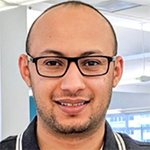The promise of machine learning to dramatically reduce timelines in a lengthy drug discovery process is exciting, but it relies on the ability to generate a trusted set of empirical data and the continuous iteration of models.
In this webinar, the featured speakers will demonstrate their iterative and machine learning-driven discovery engine across multiple disease targets to predict novel, active chemical scaffolds and recognize SARs otherwise not identified by public data alone. Using a rapid combinatorial library and microfluidic high-throughput screening technology, it is possible to quickly design, build and screen molecular libraries to discover bioactive molecules (and inactive molecules) with quality dose-response data. This dose-response data allows library-wide SAR characterizations, empowering deep-learning QSAR model predictions and novel lead generation. The result is core starting points and activity-predictive models that expedite decision-making steps during chemical series progression.
The frontier of medicine is often fraught with early discovery decisions based on limited empirical data. While biologics discovery has been accelerated by leveraging nature’s tools for site-selective mutagenesis and rapid maturation or optimization, small molecule discovery is in desperate need of new tools that will similarly allow rapid learning cycles and optimization of clinically relevant drug properties.
In this webinar, the speakers will explore how empirical and computational platforms scout chemical space, generate measures of SAR and map the critical structural patterns to predict activity and guide development. They also explore the molecular space not previously examined and create predictions to streamline optimization toward higher potential lead molecules.
Join this webinar to learn how custom chemistry and machine learning bring medicines to patients faster.
Speakers

Ghotas Evindar, PhD, SVP Discovery, 1859
Ghotas Evindar, SVP Discovery, brings deep expertise to lead 1859’s AI/ML platform development for rapid lead discovery. With a Ph.D. in organic chemistry (University of Toronto), he has authored 50+ publications and patents in drug discovery and DNA-encoded library (DEL) technology. Ghotas started his career at Vertex Pharmaceuticals, where he was instrumental in advancing four clinical candidates. He later spent 15+ years at GlaxoSmithKline and Praecis Pharmaceutics (acquired by GSK) working on portfolio, library, and selection design; data analysis; hit identification; and H2L medicinal chemistry. As VP, Drug Discovery at Exo Therapeutics, Ghotas led their small molecule drug discovery programs.

Andrew MacConnell, PhD, Cofounder and Scientific Fellow, 1859
Andrew MacConnell, Ph.D., co-founder and Scientific Fellow at 1859, brings deep interdisciplinary expertise and a strong innovative and entrepreneurial spirit to drive next-generation therapeutic discovery. His background in chemistry, molecular biology, microfluidics, optics, system automation, and data informatics has resulted in innovative instrumentation and key strengths in platform integration. As a serial entrepreneur, he also co-founded Plexium, a platform accelerating discoveries of new cancer, neurodegeneration, and other disease therapies. Andrew holds a B.S in physics, M.S. in chemistry, and earned his Ph.D. in chemistry at Scripps Research.

Hossam Ashtawy, PhD, Director of AI and ML,1859
Hossam Ashtawy, Ph.D., Director of AI and ML at 1859, brings extensive expertise in developing & applying AI/ML in drug discovery and design. His background in computer engineering, machine learning, drug discovery, and cheminformatics has resulted in several state-of-the-art machine-learning bioactivity models and related publications. Prior to joining 1859, Hossam led the development of ML potency and ADMET models at Atomwise that helped discover novel therapeutics and advance them to later stages of the drug discovery process. Additionally, he served as a tech lead for the Path Planning & Automated Driving team at Ford Motor Company. Hossam holds a B.S. and M.S. degree in computer engineering and earned his Ph.D. in electrical and computer engineering at Michigan State University where he conducted multi-disciplinary research concerned with machine learning and its application in drug discovery.
Who Should Attend?
Biotech and Pharmaceutical Professionals looking to explore how the next generation of custom chemistry, miniaturized screening technology and machine learning can be combined to accelerate drug discovery and advance hit molecules to the lead stage and beyond.
What You Will Learn
Attendees will gain insights into:
- How the trajectory of the drug discovery landscape is changing in response to the emerging, next generation technologies
- How data-informed and AI-guided chemical library design opens the door for small molecules to address “undruggable” targets and novel modalities
- How leading-edge machine learning and cheminformatics tools enable medicinal chemists to identify the most advanceable lead molecules and optimize for clinical success
Xtalks Partner
1859
At 1859, we combine machine learning and empirical screening data to discover new small-molecule medicines for emerging disease targets. Leveraging proprietary technologies, 1859 partners with pharmaceutical, biotech, and academic organizations to dramatically shorten the time and resources needed to identify and screen high-potential compounds for future exploration and development.
You Must Login To Register for this Free Webinar
Already have an account? LOGIN HERE. If you don’t have an account you need to create a free account.
Create Account

